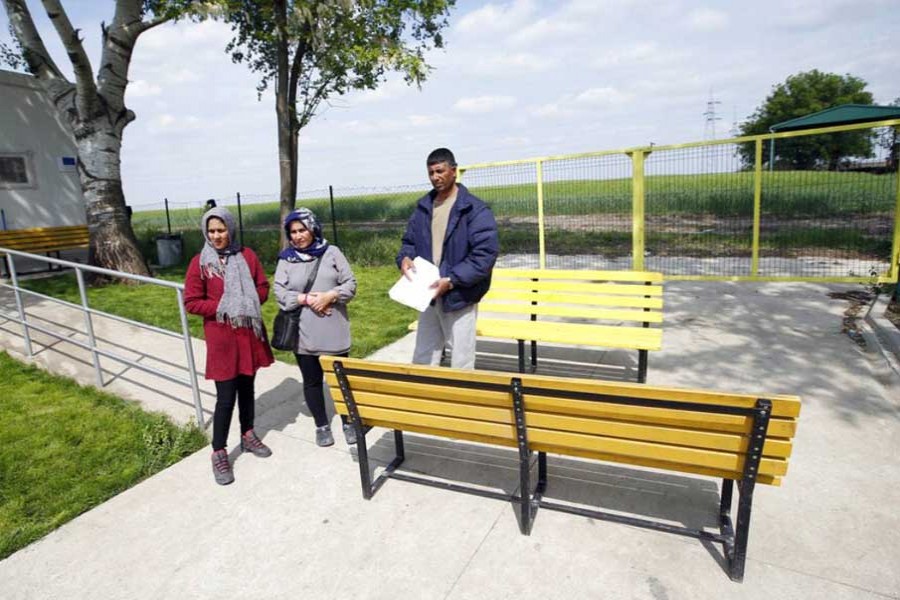When they set off for Europe with their families some four years ago, two Afghan brothers never expected a European Union country to crush their dreams in the dark of night.
Their hopes were dashed when Hungarian authorities deported the two families of asylum-seekers to Serbia a few hours apart on Tuesday night — altogether four adults and seven children.
Night deportations are unusual, and human rights groups said no one was waiting to pick up the families on the Serbian side of the border. The UN Refugee Agency strongly condemned the expulsions Wednesday, reports AP.
"Hungary's actions overnight to force two asylum-seeking Afghan families to leave the country under duress is deeply shocking and a flagrant violation of international and EU law," the agency said.
The European Court of Human Rights suspended Hungary's plan to deport a third Afghan family, according to both the UN agency and the Hungarian Helsinki Committee, a human rights group.
Hungary tightened its asylum eligibility rules last year. One change denied petitions from asylum-seekers who travelled through countries where they were not persecuted or at risk of persecution before reaching Hungary. That would include those who took the land route through the Balkans and entered Hungary from Serbia.
A teenage member of the second family ejected from Hungary after its asylum application was rejected told The Associated Press that "everything was terrifying last night" and both families were deeply disappointed.
Speaking at a Serbian migrant camp in the border town of Subotica, Mohammad Arab, 16, said Hungarian police told his family of five they could be sent either to Afghanistan or to Serbia, where they had already spent more than two years.
"They treat us like we are not human, like we are animals," Arab said in English. "They don't care if my mother is pregnant, they don't care about any human rights, they don't care about anything."
Hungary has a double line of fences crowned with razor wire and equipped with sensors, cameras and watchtowers on its southern border with Serbia. The government has insisted several strands of electrified wiring in front of the fences are not meant to harm trespassers.
The government of right-wing Prime Minister Viktor Orban added the reinforcements starting in mid-2015. At the time, the height of a mass migration wave that caught Europe unprepared for refugees fleeing Syria, Iraq and Afghanistan, nearly 10,000 people entered Hungary from Serbia on some days, hoping to reach countries in western Europe.
Arab said his family, which lived in Iran before starting their journey through Turkey, Greece and what is now known as North Macedonia, waited for more than two years in Serbia for a chance to seek asylum in Hungary. They didn't want to enter the country illegally with the help of people smugglers, as many migrants do, he said.
The family then spent more than three months in Hungary's border migrant camp. Arab said his family felt that Hungarian authorities did not seriously consider their asylum application before rejecting it. They appealed, but in vain.
"Two and a half years I spent to go to Hungary, and it was useless," he said.
The teen said they learned of their deportations the night before and "didn't believe them at first." Reality set in when police officers arrived to take them Tuesday.
"My uncle's wife fell down (and) started crying. My mother passed out. They took her to hospital," Arab said.
The UN agency said staff members in Hungary observed the families crossing the border and alerted colleagues in Serbia, who in turn informed Serbian authorities.
"The treatment of these families, including their removal from Hungarian territory with no serious effort to look at their claims to refugee status, is deeply regrettable," UN High Commissioner for Refugees Filippo Grandi said.
Arab and his cousin, who is also named Mohammad, said human rights workers gave them the name of a Serbian refugee official to contact. The official eventually picked the Afghan families up at the border.
The 16-year-old said their belief in Europe's high human rights standards has been badly tested. He said they might seek asylum in Serbia, a poor Balkan country that went through a series of wars and crisis in the 1990s.
"We hoped to have better future and (to) study ... to be someone useful for people, not be a useless person," the teen said. "I don't have my dreams anymore."


